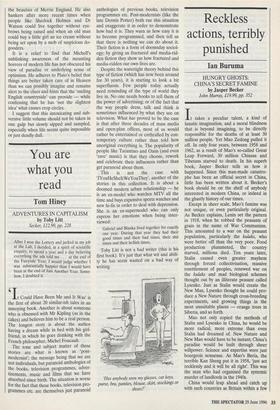You are what you read
Tom Hiney
ADVENTURES IN CAPITALISM by Toby Litt
Secker, £12.99, pp. 228
After I won the Lottery and jacked in my job at the Lab, I decided, in a spirit of scientific enquiry, to spend a year and a day believing everything the ads told me . . . at the end of the Fairytale Year, I would judge whether I was substantially happier than I would have been at the end of Just Another Year. Some- how, I doubted it.
t Could Have Been Me and It Was' is the first of about 20 similar-ish tales in an annoying book. Another is about someone who is obsessed with Mr Kipling (as in the cakes) and believes him to be a real person. The longest story is about the author having a dream while in bed with his girl- friend, in which he goes drinking with the French philosopher, Michel Foucault. The tone and subject matter of these stories are what is known as 'post- modernise; the message being that we are not individuals, but paranoid anthologies of the books, television programmes, adver- tisements, music and films that we have absorbed since birth. The situation is worse for the fact that these books, television pro- grammes etc. are themselves just paranoid anthologies of previous books, television programmes etc. Post-modernists (like the late Dennis Potter) both rue this situation and exaggerate it in order to demonstrate how bad it is. They warn us how easy it is to become programmed, and then tell us that there is nothing we can do about it. Their fiction is a form of doomsday sociol- ogy; by giving us fractured and media-rid- den fiction they show us how fractured and media-ridden our own lives are.
Despite the watertight theory behind this type of fiction (which has now been around for 30 years), it is starting to look a bit superfluous. Few people today actually need reminding of the type of world they live in. No one needs books to tell them of the power of advertising; or of the fact that the way people dress, talk and think is sometimes influenced by what they see on television. What has proved to be the case is that after three decades of mass media and open-plan offices, most of us would rather be entertained or enthralled by con- temporary culture rather than told how unoriginal everything is. The popularity of people like Tarantino and Oasis (and even `rave' music) is that they choose, rework and celebrate their influences rather than get paranoid about them.
This is not the case with `IYouHeSheItWeYouThey', another of the stories in this collection. It is about a doomed modern urban relationship — he is an ex-model who watches MTV all the time and buys expensive sports watches and new hi-fis in order to deal with depression. She is an ex-supermodel who can only express her emotions when being inter- viewed:
Gabriel and Blanka lived together for exactly one year. During that year they had their good times and their bad times, their shit times and their hellish times.
Toby Litt is not a bad writer (this is his first book). It's just that what wit and abili- ty he has seem wasted on a bad way of writing.
Has anybody seen my glasses, car keys, purse, bra, panties, blouse, skirt, stockings or shoes?'


























































 Previous page
Previous page